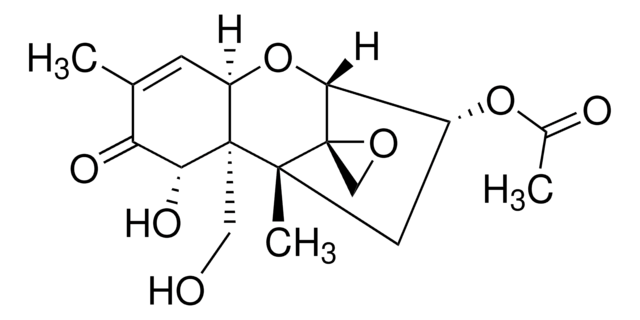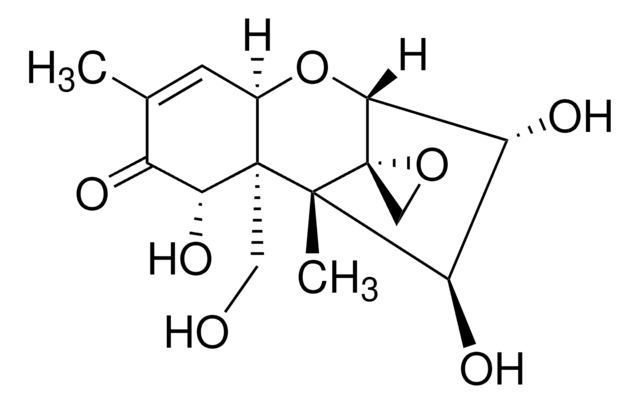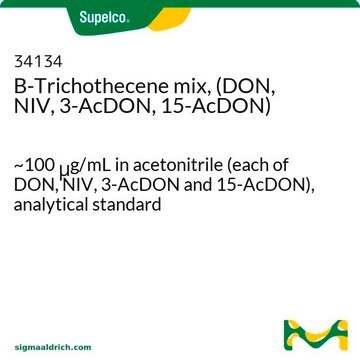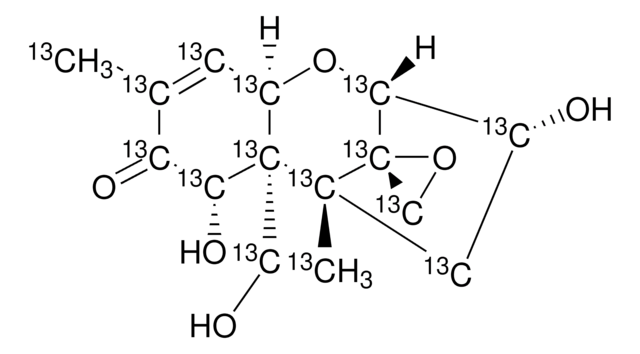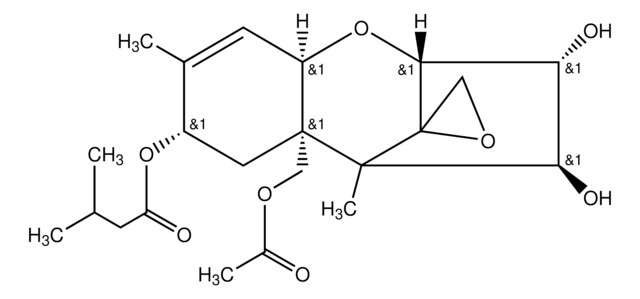34132
3-Acetyldeoxynivalenol solution
~100 μg/mL in acetonitrile, analytical standard
Synonyme(s) :
3α-Acetoxy-7α,15-dihydroxy-12,13-epoxytrichothec-9-en-8-one, 3α-Acetylvomitoxin, 3-ADON, 3-AcDON
About This Item
Produits recommandés
Qualité
analytical standard
Niveau de qualité
Durée de conservation
limited shelf life, expiry date on the label
Concentration
~100 μg/mL in acetonitrile
Technique(s)
HPLC: suitable
gas chromatography (GC): suitable
Application(s)
cleaning products
cosmetics
food and beverages
personal care
Format
single component solution
Température de stockage
−20°C
Chaîne SMILES
CC(=O)O[C@@H]1C[C@@]2(C)[C@]3(CO3)[C@@H]1O[C@@H]4C=C(C)C(=O)[C@@H](O)[C@]24CO
InChI
1S/C17H22O7/c1-8-4-11-16(6-18,13(21)12(8)20)15(3)5-10(23-9(2)19)14(24-11)17(15)7-22-17/h4,10-11,13-14,18,21H,5-7H2,1-3H3/t10-,11-,13-,14-,15-,16-,17+/m1/s1
Clé InChI
ADFIQZBYNGPCGY-HTJQZXIKSA-N
Catégories apparentées
Description générale
Application
Remarque sur l'analyse
Mention d'avertissement
Danger
Mentions de danger
Classification des risques
Acute Tox. 4 Dermal - Acute Tox. 4 Inhalation - Acute Tox. 4 Oral - Eye Irrit. 2 - Flam. Liq. 2
Code de la classe de stockage
3 - Flammable liquids
Classe de danger pour l'eau (WGK)
WGK 2
Point d'éclair (°F)
35.6 °F - closed cup
Point d'éclair (°C)
2.0 °C - closed cup
Équipement de protection individuelle
Eyeshields, Faceshields, Gloves, type ABEK (EN14387) respirator filter
Choose from one of the most recent versions:
Déjà en possession de ce produit ?
Retrouvez la documentation relative aux produits que vous avez récemment achetés dans la Bibliothèque de documents.
Les clients ont également consulté
Notre équipe de scientifiques dispose d'une expérience dans tous les secteurs de la recherche, notamment en sciences de la vie, science des matériaux, synthèse chimique, chromatographie, analyse et dans de nombreux autres domaines..
Contacter notre Service technique

